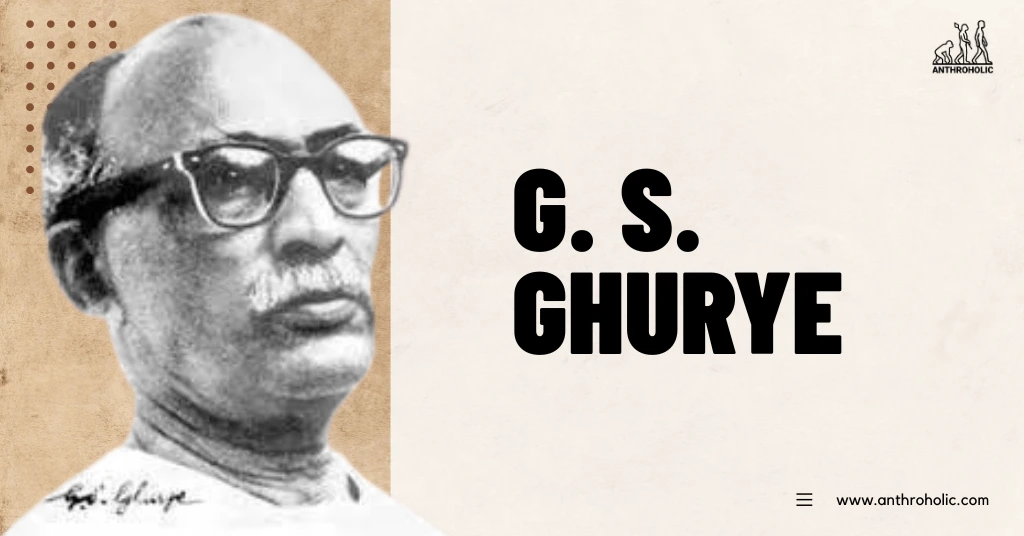AI Answer Evaluation Platform Live Now. Try Free Answer Evaluation Now
Govind Sadashiv Ghurye
In the early decades of the 20th century, as India grappled with its colonial realities and searched for its intellectual self-definition, Govind Sadashiv Ghurye emerged as a pioneering voice in sociology and anthropology. Often hailed as the father of Indian sociology, Ghurye was among the first scholars to systematically study Indian society through both textual traditions and empirical observation.

His scholarship straddled the worlds of ancient Indian texts, caste dynamics, tribal identities, and the challenges of modernity. From Cambridge’s hallowed academic circles to the lecture halls of Bombay University, Ghurye’s journey was marked by a desire to reclaim the Indian social experience from Western frameworks while engaging deeply with them.
A prolific writer and a demanding mentor, his intellectual legacy lives on through the institutions he built, the disciplines he shaped, and the generations of scholars he trained. His work on caste, race, and civilization remains foundational in Indian social science discourse even today.
Early Life and Education
Govind Sadashiv Ghurye was born on 12 December 1893 in Ratnagiri, Maharashtra, into a Chitpavan Brahmin family known for its scholastic tradition. His upbringing was deeply embedded in classical Indian learning, with early exposure to Sanskrit texts, Hindu rituals, and the philosophical underpinnings of the Indian intellectual tradition. This foundation would later shape his methodological preference for Indological sources in sociological analysis.
He completed his undergraduate studies in Sanskrit at Elphinstone College, Bombay, where his academic brilliance stood out. It was during this period that he began engaging with broader questions about Indian society-not just through scriptural interpretation, but by thinking critically about contemporary realities like caste hierarchies and social reform.
In 1919, Ghurye received a scholarship to study at University of Cambridge, where he was mentored by W.H.R. Rivers, a noted figure in early anthropology and psychology. Under Rivers, he developed an appreciation for ethnographic methods and cultural relativism, blending these insights with his Indian philosophical training. Although Rivers passed away during Ghurye’s studies, this exposure left a lasting impact, helping him synthesize Western sociological frameworks with Indian civilizational analysis.
He earned his M.A. from Cambridge and later completed his doctoral dissertation titled The Caste and Race in India, which would go on to become one of his most influential works after its publication in 1932.
Academic Career
Returning to India in the early 1920s, Ghurye was appointed as a professor in the Department of Sociology at the University of Bombay. Just a year later, in 1924, he became the head of the department, a role he held until his retirement in 1959. Under his stewardship, the Bombay department grew into India’s first major center of sociological teaching and research, attracting students from across the country.
He was instrumental in introducing a full-fledged postgraduate curriculum in sociology, including papers on Hindu social institutions, Indian tribes, urbanization, and race relations. His approach, which combined textual study (especially of Sanskrit sources) with fieldwork and statistical methods, was pioneering for its time.
Ghurye was also a tough and rigorous mentor. His students recall a man deeply committed to discipline and scholarship, who pushed them to engage critically with both classical texts and empirical data. Among his notable protégés was M.N. Srinivas, who would go on to become a major figure in Indian sociology himself.
Throughout his tenure, Ghurye worked to institutionalize sociology as an academic discipline in India. He played a key role in the formation of the Indian Sociological Society in 1951 and served as its first president. He was also involved with other academic bodies, including the Indian Council of Social Science Research (ICSSR).
His long academic career was not limited to classrooms. Ghurye frequently wrote for journals, gave lectures across the country, and served on government committees that dealt with tribal policy, caste reforms, and cultural integration.
Major Contributions to Sociology and Anthropology
Govind Sadashiv Ghurye’s work carved a distinct niche in the field of Indian sociology by addressing the deep-rooted structures of Indian society through both classical texts and empirical study. His contributions can be grouped into several core areas:
Caste and Race in India
His most famous work, Caste and Race in India (1932), remains a landmark study. In it, Ghurye argued that the caste system was not merely a social hierarchy but a complex cultural and religious institution with roots in endogamy, occupational differentiation, and ritual purity. He challenged Western racial theories that attempted to equate caste with race, asserting instead that caste was a socially constructed phenomenon deeply intertwined with Indian history and religion.
The Scheduled Tribes
Ghurye was among the first Indian scholars to write critically about the tribal populations of India. In The Scheduled Tribes (1943), he questioned the British colonial classification of tribes as distinct from the Hindu social order. He argued that many tribal communities were not isolated primitives but had long interacted with caste society. His theory of Hinduisation (a precursor to what M.N. Srinivas would later call Sanskritization) suggested that many tribes were gradually assimilating into the broader Hindu fold.
Urbanization and Social Tensions
Ghurye was deeply concerned about the challenges of modernity and urban life in India. His later work, such as Social Tensions in India (1968), examined the impact of industrialization, migration, and communal conflict, making him one of the earliest Indian scholars to study urban sociology and social disorganization.
Kinship, Family, and Religion
He also contributed to studies on family structures, kinship systems, and the role of religion in maintaining social cohesion. His work stressed the enduring role of traditional institutions in shaping identity and behavior, even in changing socio-economic contexts.
Theoretical Perspectives and Methodology
Ghurye’s sociological perspective was distinctive for its blend of Indology and empirical sociology. Unlike many of his contemporaries, he firmly believed that India’s classical literature, particularly the Vedas, Puranas, and Dharmashastras, were legitimate and necessary sources for understanding Indian society.
Indological Approach
His commitment to Indology was not just cultural but methodological. He argued that to understand Indian society, one must analyze the normative ideals embedded in sacred texts alongside lived social practices. This positioned him in contrast to later empiricist sociologists who focused solely on fieldwork.
Comparative and Historical Methods
Ghurye also employed comparative sociology, drawing parallels between India and other civilizations, particularly in terms of race relations, urbanization, and civilizational continuity. He believed sociology should incorporate history, literature, and culture, making it an interdisciplinary pursuit.
Critique of Western Theories
While trained under British sociologists, Ghurye was critical of Western theories that ignored Indian realities. He rejected reductionist models that viewed Indian society as static or overly religious. Instead, he offered nuanced, contextual interpretations that acknowledged change, conflict, and continuity within Indian institutions.
Cultural Nationalism
Though not overtly political, Ghurye’s writings reflected a form of cultural nationalism. He emphasized integration over fragmentation, and believed that Indian sociology had the task of strengthening national unity through deeper understanding of cultural plurality.
His intellectual method laid the groundwork for what would become a uniquely Indian school of sociology, combining textual knowledge, historical insight, and sociological rigor.
Legacy and Influence of Govind Sadashiv Ghurye
Govind Sadashiv Ghurye left behind a towering legacy, not just as a scholar, but as a nation-builder through sociology. His work laid the foundation for a distinctly Indian sociological tradition—rooted in civilizational continuity, cultural complexity, and a keen awareness of social transformation.
One of Ghurye’s greatest legacies was his institution-building role. The Department of Sociology at the University of Bombay became a model for other departments across India, producing generations of sociologists who would carry forward his vision. His student, M.N. Srinivas, went on to coin influential concepts like Sanskritization and dominant caste, many of which were built upon Ghurye’s early insights.
Ghurye’s writings continue to be read, cited, and debated in Indian academia. His commitment to studying Indian society on its own terms, while engaging deeply with international academic debates, remains influential in today’s efforts to decolonize social science disciplines.
In recognition of his contributions, he was awarded several honors, including the Padma Bhushan in 1964, one of India’s highest civilian awards. Even after his retirement in 1959, he continued writing, editing journals, and mentoring scholars.
Though newer generations have critiqued his Indological approach for overlooking the lived contradictions of caste and tribal marginalization, Ghurye’s work laid the epistemological scaffolding for Indian sociology. His integration of classical texts, empirical research, and interdisciplinary thinking gave Indian social sciences both intellectual depth and national relevance.
Govind Sadashiv Ghurye passed away in 1983, but his influence persists in curricula, textbooks, and the ongoing debates over caste, identity, and tradition in India.
References
- Your Article Library – Biography and Contributions to Indian Sociology
Detailed account of his scholarly work and influence on Indian sociology.
https://www.yourarticlelibrary.com/sociology/govind-sadashiv-ghurye-biography-and-contribution-to-indian-sociology/35012 - Sociology Group – Govind Sadashiv Ghurye: Biography and Contributions
Covers early life, education, Cambridge journey, academic career, and key writings.
https://www.sociologygroup.com/govind-sadashiv-ghurye-bio - INSA – Indian National Science Academy (Deceased Fellow Profile)
Official institutional record of Ghurye’s academic achievements.
https://insaindia.res.in/old_website/detail.php?id=N41-0282




